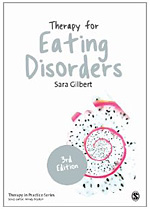Eating and weight issues
What is an eating disorder?
Eating disorders can affect anyone regardless of age, gender, or background. The commonly accepted view is that sufferers are mostly young women between the ages of 15 and 25. But men suffer too, and both men and women of any age can continue to struggle with eating issues for many years, though very many avoid seeking help; and research from universities in London and New York has shown that for many women, their problems with eating begin in later life.
Eating disorders are complex, and determining their original cause is not always easy or helpful. Even the word "disorder" is problematic, as anyone can have periods in their life when they over or under eat for emotional reasons or in response to a specific stress. But such difficulties can develop as outward signs of acute or longstanding emotional or psychological problems and severely restricting food or overeating can happen in phases or it can become a way of life. Eating too much or too little may be used to block out or avoid painful feelings. Anorexia and bulimia can give sufferers a sense of control in their life but eventually the eating disorder itself can seem to take control and seriously damage their health and well-being.
Is obesity an eating disorder?
Certainly not. Many people with eating disorders are overweight but there are many reasons why people become overweight or obese. Nevertheless, out of control eating is an issue for many overweight people, either because they simply find it difficult to reduce their intake enough to produce a small consistent weight loss, or because they are in the habit of overeating when under stress. For some people, eating more than they need to maintain a healthy weight has become so normal that it can be difficult to work out how and whether a tendency to overeat was triggered in the first place, or what keeps it going now.
Treatment for eating and weight difficulties
Psychological treatment can help people to discover new ways to change ingrained habits, or recognise unhelpful strategies they have learned for coping with emotional problems and develop new ways to pursue their life goals.
Several different aspects of treatment can help someone who experiences difficulties in their relationship with food. One important aspect of therapy is an exploration of the part your relationship with food and eating or restricting your diet plays in your life, and what it would mean to you if things were different and that relationship were to change. This can be an issue both for people who are in the process of restoring their weight after extreme weight loss; and also for those who have lost or are about to lose a significant amount of weight through dieting or with the help of surgery or weight loss drugs.
It is often said that eating disorders arise out of the emphasis in today’s society on health and slimness and the pressure we are under to be "toned" and fit in with an ideal image. This may be the case for some of us, and a part of any treatment programme is likely to involve thinking about our attitudes to shape and weight and how we see ourselves in relation to other people. Other issues that are important however may revolve around a more personal relationship with food and eating and the place food holds in our emotional life as well as thinking about the different strategies we use to cope with stress in both our personal relationships and the world around us. Therapy can help people to develop an awareness of these issues and focus on strategies for change. The strategies we develop through our discussions may be as simple as re-thinking your lifestyle so as to create and learn different ways to tackle problems and stress, or involve a more complex approach which explores new strategies to tolerate and express difficult feelings. Learning new strategies to cope with emotions or re-thinking lifestyle can be just as important for someone who has adopted a medical solution to their weight problem as it is for someone who is able to achieve their goals through dietary change alone.
Treatment for an eating issue may involve a combination of approaches: medical, nutritional, practical and psychological, in order to help the person to restore a healthy weight and improve their relationship with food and their bodies. While I can work with you to address the practical and psychological aspects of your problem you may also need to be under the care of your GP or another medical practitioner especially if your weight is very low or very high or if you have physical symptoms that require medical monitoring.
Workshops and discussion groups
I can offer workshops or informal discussions for small groups of people who want to explore issues around weight problems, obesity, overeating, undereating and body image, and ideas about how to tackle them, and the impact on us of an increasing preoccupation with weight, food, shape, obesity and fitness. This kind of discussion can be helpful in a range of settings - in social groups, health clubs, slimming organisations, the workplace, or in schools; and either in the form of one-off meetings and discussion groups or as a series of weekly sessions. Currently, I am working mainly on line and could offer seminars/workshops through zoom or another medium if that is more appropriate to your setting.
Publications
I have written several articles and book chapters; and three books on the subject of eating disorders and dieting.
Gilbert, S. (2014) Therapy for Eating Disorders : Theory, Research & Practice. Sage.
I have updated this book on two occasions and was delighted to see it published in a 3rd edition. in 2014
Gilbert, S. (2013) Pathology of Eating: Psychology and Treatment. ed. T. Silverstone, Routledge and Kegan Paul. (first published in 1986)
Gilbert, S. (2013) Tomorrow I’ll Be Slim: The Psychology of Dieting. Routledge (first published in 1989)
There are two German paperback editions; and the book has also been published in Romanian, by Editura Trei of Bucharest.
Media work
I contributed regularly to Slimming Magazine from 1992-2000.
Other work has included consultancy for an internet diet site, advice to journalists on the subject of diet and eating disorders, appearances on radio and TV interviews.

